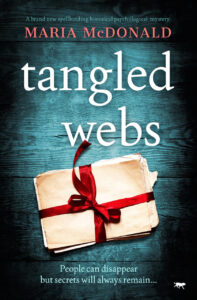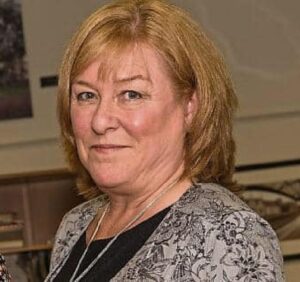Launch: Maria McDonald’s Tangled Webs
INTERVIEW BY KATHERINE MEZZACAPPA
Belfast born but raised in Kildare, Maria McDonald has always been an avid reader who only discovered her passion for writing fiction after early retirement. In 2018 she published Charlie Mac, a fictionalised biography about her great-grandfather, which sparked her interest in historical fiction. After signing a two-book contract in 2022 with Bloodhound Books UK, she published The Devil’s Own in January 2023 and Tangled Webs in September 2023.
How would you describe Tangled Webs and its themes in a couple of sentences?
It’s the story of two war widows running a boarding house in Belfast in the 1920s. Their guests are young women who have left home to work mainly in the linen mills. A meeting with the grandfather of one of the girls threatens to reveal a secret in the lives of the two women, dating back to the Anglo-Zulu Wars, which could unravel everything they have worked so hard to build.
 Having read both Tangled Webs and your previous novel, The Devil’s Own, I noted that both books, in addition to having a mystery at the heart of each, also had themes of military history in the context of colonialism. What is it that drew you to that theme?
Having read both Tangled Webs and your previous novel, The Devil’s Own, I noted that both books, in addition to having a mystery at the heart of each, also had themes of military history in the context of colonialism. What is it that drew you to that theme?
I was born in Belfast, but when I was sixteen, in 1976, our parents packed everything up and moved us south to Newbridge, Co Kildare. This was in the context of the Troubles; the deaths of the Maguire children was the last straw for them. Going to school in Newbridge, I discovered that the history taught there was a markedly different curriculum from what was taught in Northern Ireland. Only there, for instance, did I learn about the Dublin Lockout.
When I researched my family history, I learned that my great-grandfather, a Protestant married to a Catholic, was shot by the B Specials (the successors to the Black and Tans), yet his son served in the British Army (something my father didn’t talk about). On my great-grandfather’s headstone it reads ‘murdered for his faith’. I wrote his story for my family and self-published Charlie Mac in 2018.
My husband served twenty-one years in the Irish Army, and I lived for a while in army accommodation in The Curragh. Most people would now associate that name with horse-racing, but it was the largest army camp in the British Empire. Many of the buildings of that era are still there.
Your settings are equally convincing, whether you are writing of the Rosetta area of Belfast or of southern Africa during the Zulu wars. Do you visit locations as part of research?
I know modern Belfast, of course, but none of us can know first-hand what it was like to live in at the time I am writing about. It was hard enough even trying to describe to my younger brothers and sisters what it was like to live in Belfast in the 1970s. The Southern Africa settings are based on a series of Newbridge military seminars I attended. The name Isandlwanda stuck; I realised I wanted to write about what happened there.
In this story, we have barrack life. We have a sort of parallel in the lives of the young women living at Riverview – they, like the young soldiers and nurses, are away from home for the first time. What of your own experience might you have brought to the book?
There is my military experience of course, but also the experience that many of us have of leaving home – in my case, when I married, aged 22. I still find it hard to be away from family, even, for instance, when I was at a residential at the Tyrone Guthrie Centre in Co. Monaghan. The quietness was hard.
Which character did you find most challenging to write about? Or who, indeed, felt most alive to you as their author?
Well, they are all kind of tangled up with each other, as none of them act in isolation. I like characters to move across books. Mrs Best had a cameo part in Charlie Mac, takes centre stage in Tangled Webs and will reappear briefly in my next novel about war brides in Cork in 1917.
In both your novels, you deal with questions of identity. Arthur and Henry in The Devil’s Own is one version of this. In Tangled Webs, so also is Iris’s grandfather, who turns out to be a prototype Davy Tweed, an apparently upstanding member of the community who is in private a monster. And then there is the enigmatic Jane Best – but we are not going to allow any spoilers in this interview! There is much debate now about how people define themselves and how others think they ought to define themselves, which gives your book a modern resonance. Have contemporary arguments about identity and gender influenced this choice of theme?
This book predates current controversies, but I was thinking about James Miranda Barry, who disguised herself as a man to practise as a doctor. Given the greater difficulties women once faced in getting a job and building a career, it was less clear why a man would want to be a woman (from the economic point of view).
 J.G. Farrell’s Empire Trilogy is composed of three standalone books which have colonialism as their uniting theme. Is there going to be a third with military history as a theme for you?
J.G. Farrell’s Empire Trilogy is composed of three standalone books which have colonialism as their uniting theme. Is there going to be a third with military history as a theme for you?
Yes. The Keeper of Secrets will come out in Spring 2024. There were over one hundred girls from the Cork area who married American servicemen. My heroine Lizzie lived on a country estate in East Cork, owned by largely absentee landlords, where her sister is raped by her master. Lizzie moves to Queenstown where she is warned to stay away from the Americans. She falls in love with serviceman Ed, and they marry. After the war Lizzie goes with Ed to the vast airforce base at Pensicola, settling in well despite heat and humidity, and doesn’t set foot in Ireland again until the 1960s, coming back to quite a different Ireland in that post-Kennedy assassination era.
What are you working on now?
I’m about a tenth of the way into my new book about Amanda, a character from Tangled Webs.
What is the last great book you read?
Hazel Gaynor’s The Last Lifeboat.
![]()






